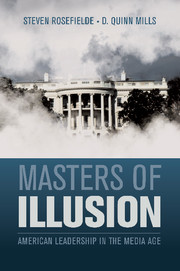Book contents
- Frontmatter
- Contents
- List of Tables and Figures
- Preface
- Acronyms
- Executive Summary
- Acknowledgments
- PART I NATIONAL SECURITY IN THE NEW AGE
- PART II AMERICAN PUBLIC CULTURE AND THE WORLD
- PART III AMERICAN PUBLIC CULTURE AND OURSELVES
- PART IV THE RECONFIGURATION OF NATIONAL WEALTH AND POWER
- PART V VORTEXES OF DANGER
- PART VI THE AMERICAN RESPONSE
- PART VII LEADING TOWARD PEACE
- PART VIII AMERICAN PRESIDENTIAL LEADERSHIP
- 18 How Public Culture Inhibits Presidential Leadership
- 19 Choosing a Great President
- 20 Master of Illusions
- Notes
- Glossary
- Bibliography
- Index
19 - Choosing a Great President
Published online by Cambridge University Press: 31 July 2009
- Frontmatter
- Contents
- List of Tables and Figures
- Preface
- Acronyms
- Executive Summary
- Acknowledgments
- PART I NATIONAL SECURITY IN THE NEW AGE
- PART II AMERICAN PUBLIC CULTURE AND THE WORLD
- PART III AMERICAN PUBLIC CULTURE AND OURSELVES
- PART IV THE RECONFIGURATION OF NATIONAL WEALTH AND POWER
- PART V VORTEXES OF DANGER
- PART VI THE AMERICAN RESPONSE
- PART VII LEADING TOWARD PEACE
- PART VIII AMERICAN PRESIDENTIAL LEADERSHIP
- 18 How Public Culture Inhibits Presidential Leadership
- 19 Choosing a Great President
- 20 Master of Illusions
- Notes
- Glossary
- Bibliography
- Index
Summary
A great irony of the American political process – one can almost say the internal contradiction in it that threatens to make a failure of the whole thing – is that the Constitution grants the president power primarily in foreign affairs, while he or she is elected primarily on domestic issues. Put into a nutshell – as an old saw says – in domestic matters the president proposes and the Congress disposes; in foreign affairs the Congress proposes and the president disposes! But the choice of a president presumes exactly the opposite. The result is that we get a president ill-equipped for his or her foreign policy responsibilities, and frustrated by his or her lack of power in domestic matters. In the preceding chapter, we've seen the unfortunate result of this inconsistency. A key challenge today is whether the American people in their new maturity can overcome this limitation of our political tradition.
A LEADERSHIP DEFICIENCY
According to a report from a conference in the fall of 2003 of leading specialists on international relations in Asia: America appears even to its regional allies to be a difficult and often unpredictable power. We are said to be erratic and unpredictable, adding a major element of instability to the world. Some panelists characterized the United States approach to security issues in post–Cold War Asia as seeking to maintain an environment of stability and friendly relations, but doing so with ad hoc methods and on the basis of American primacy, with little effort to establish supporting institutions or a viable balance of power structure.
- Type
- Chapter
- Information
- Masters of IllusionAmerican Leadership in the Media Age, pp. 436 - 445Publisher: Cambridge University PressPrint publication year: 2006

